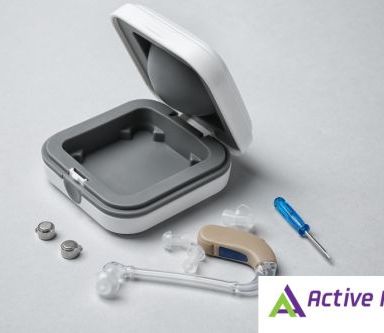
Flying is a very common form of transportation, and we rarely think about how the sound level on airplanes can cause noise-induced hearing loss. The combination of loud engines and constant air movement can really take a toll on our hearing. The sound level in airplanes is 85 dB, and it only gets louder the closer you are to the back.
As an ear hearing specialist, Active Hearing Health knows the importance of protecting your ears from loud sounds. Damage to our ears begins at any noise level about 70 dB. Exposure to that level of noise for a prolonged period of time can cause hearing loss and tinnitus. We don’t want you to stop traveling, but we do want you to be aware of what damage can be done and take the right precautions.
All about airplane ear
Airplane ear, also known as ear barotrauma, is when the air pressure in your middle ear and the air pressure in the environment are out of balance; this puts stress on the eardrum. You may experience this during takeoff and landing. This can occur in one of both of the ears. Symptoms include a pain or discomfort in your ear, your ears feeling clogged, and muffled sounds.
Ways to protect your hearing while flying
There are several ways you can cope with airplane ear while flying. Staying awake during takeoff and landing is the first step. Yawning, swallowing, and chewing gum during the ascent and descent activates the muscles that open the eustachian tubes. You can also try plugging your nose and blowing out, while keeping your mouth closed, to relieve some of the pressure.
If possible, try and choose the quietest part of the plane. Seats next to the window and towards the back are going to be the loudest; seats in the aisle and towards the front are your best option.
Wearing ear plugs during the beginning and end of the flight can help protect your ears, as well. Using noise-canceling headphones can also help. If you’re listening to music to drown out the sounds, the level is usually going to be around 93 dB, so it may be best to use headphones that work to drown out the sound so your music doesn't need to be so loud.
Drinking water and staying hydrated is also imperative. Drinking fluids, excluding alcohol, will help you feel your best because the pressured air inside the plane doesn’t have as much oxygen as our bodies are used to. Staying hydrated will help you not feel weak. Also, swallowing helps relieve the pressure in your ears.
Visiting an ear hearing specialist
Knowing when it’s time to see an ear hearing specialist will help you out in the long run. At Active Hearing Health, we perform hearing tests to evaluate your degree of hearing loss. From there, we can come up with a treatment plan. If you want to schedule an appointment or if you have any hearing loss related questions, reach out to us today!






Comments